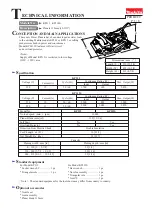
6
5.52.693.01.01.00
Pay attention to the accident prevention regulations (UVV).
Should the hoist be used outside of Germany, please pay attention to the national regulations that apply.
Supporting structures and load-attached devices used in conjunction with this equipment must provide an
adequate safety factor to handle the rated load plus the weight of the equipment. In case of doubt, consult
a structural engineer.
If the equipment has not been used for a period of time, carry out visual checks of all main components
such as chains, load hooks etc. and replace any damaged parts with new, original spare parts before
putting the equipment back into operation!
Do not use a hoist that is defective, pay attention to any abnormal noise it makes during operation.
Stop working immediately in case of disturbances and remedy failures.
Any damage and faults must be reported to a responsible supervisor immediately.
If the unit is put into motion, any persons in the immediate vicinity must be informed by calling to them!
Please pay attention to the regulations for load carrying devices UVV for both positive and non-positive
methods of attaching loads.
The lifting tackle or the load must be securely attached to the hook and be seated at the bottom of the
hook.
The safety catch of hooks must be closed.
When charged, the housing may not be in contact somewhere.
DANGER!
Special safety measures for use in areas prone to explosion.
Not to be used with IIC gases and IIB gases hydrogen sulphide, ethylene oxide and light metal and shock
sensitive dusts!
No use in temperature class T5 or T6.
It is not allowed to use the equipment in area at risk from explosion where gas AND dust does both exist
at the same time!
During assembly and operation of explosion-proof equipment, the relevant regulations of i.e. BG-Chemie
about the use of equipment in area at risk from explosion, must be adhered to by the user/owner.
Please make sure that external ventilation is sufficient.
Please wear conductive shoes. Gloves should have a shunt resistance of < 10
8
.
It is not allowed to take off clothes.
The surface temperature of the devices could increase by a variety of external circumstances. For this
reason, the surface temperature is to be monitored.
Avoid ignitable dust deposits.
Remove dust deposits daily before commencing work and ensure that dust cannot settle between moving
parts.
Never remove dust with compressed air - remove it with a wet bolt of cloth.
Defective units or units that show abrasion of its surface rust on chains, hooks, or suspension devices,
must be taken out of service.
Please observe the prescribed intervals.
Assembly and maintenance work must only be carried out in an atmosphere not prone to explosion.
Check the grease level of the bearings regularly
Exchange friction surfaces in time and (an exception to this are electric units - maintenance of the brakes
must only be effected by HADEF).
Protect the device from impact, friction, rough handling and moisture.
Special scope
Use of different EX-zones is depended from the EX-classification of the unit. Find the EX-classification on its
type plate.
Unit classified
in EX-classification
No use
in EX-zone
3G
0,20,1,21,22
3D
0,20,1,21,2
2G
0,20,21,22


































